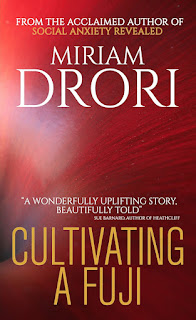Thank you, Sue. It's good to be back.
Growing up, I never dreamed of a life of crime. I didn’t even dream of becoming an author at all. My reading experience, while fairly sparse, wasn’t limited to a particular genre. Yes, I liked books by Agatha Christie and Arthur Conan Doyle, but they weren’t the only books I read.
Decades later, when I decided to turn my hand to writing books (as opposed to the technical documents that had kept me busy for many years), crime wasn’t the first genre that jumped into my brain. I began with non-fiction, which was all I felt capable of writing, certain that creativity wasn’t one of my abilities. The book was about social anxiety, an outcome of a growing passion to raise awareness of that disorder.
At some point, I began to think that fiction might be a better way of getting my message out. In fiction, you can drill inside a character’s head (metaphorically, of course) in a way you can’t in non-fiction. But I didn’t know how to write fiction and I wasn’t creative.
The first problem was alleviated by extensive reading about the craft. The second? I used settings I was familiar with and real stories of people I’d ‘met’ online. My main character was based on several of those people. I wrote my novel, worked on it with a writing group and then sent it to be professionally critiqued. Finally, I understood its main flaw: nothing happened in the story – nothing exciting, anyway.
My next task, after writing a romance and having it accepted for publication, was to find something exciting that would affect my character and become the basis of the story. A murder was my first what-if: What if my socially anxious character was accused of murder? How would he be able to stand up for himself and explain the truth to people in authority, especially in a court of law?
But then I had a different idea, planted just before an amazing trip and sprouting after it. What if my character was sent to Japan on work? How would he manage there, and how would that affect his life on returning home? These were the questions that nagged at me until I turned my thoughts into the novel, Cultivating a Fuji.
It was only when I finished it that murderous tendencies returned. The only time I had to testify from a witness stand, my performance was dismal. I also heard about a woman who wanted to testify against her rapist but found herself struck dumb in the event. How would my character manage?
When I say “my character,” I don’t mean the same character from Cultivating a Fuji. That one managed to live his whole life without being accused of murder. No, I created a new character with a new name, nationality and profession. The characters around him are different, as are the settings. And I based the story, loosely, on Beauty and the Beast, giving it a similar title: Style and the Solitary.
After the novel was accepted by Darkstroke and people began to talk about it, they mentioned the crime genre, and I suddenly realised I’d joined a vast pool of crime novelists. Up to then, I’d thought of my story as one that happened to contain a murder. I suppose I didn’t really turn to crime at all; it was more a case of crime finding me.
This whole process has taught me something else. It seems I do have an imagination and therefore an ability to be creative. I expect we all do if we put our minds to it.
Edition 2 of Style and the Solitary is now available from Ocelot Press.
An unexpected murder. A suspect with a motive. The power of unwavering belief.
A murder has been committed in an office in Jerusalem. Asaf, who works there, is the suspect. But is the case as clear-cut as it seems?
Asaf is locked in a cell and in his own protective wall, unable to tell his story even to himself. How can he tell it to a chief inspector or a judge? The fear would paralyse him.
His colleague, Nathalie, has studied Beauty and the Beast. She understands that staunch belief can effect change. As the only one who believes in Asaf’s innocence, she’s motivated to act on his behalf. But she’s new in the company – and in the country. Who will take her seriously?
She cajoles her two flatmates into helping her investigate. As they uncover new trails, will they be able to change people's minds about Asaf?
Will Nathalie’s belief in Asaf impel him to defeat his own demons and clear his name?
Style and the Solitary was released through Ocelot Press on 27th October 2022.
Miriam Drori
Miriam Drori, author, editor and social anxiety warrior, worked as a computer programmer and a technical writer before turning her attention to full-time writing. Her novels and short stories cover several genres, including crime, romance and uplifting fiction. She has also written a non-fiction book about social anxiety.
Born and raised in London, Miriam now lives in Jerusalem. She has travelled widely, putting her discoveries to good use as settings in her writing. Her characters are not based on real people, but rather are formed from an amalgam of the many and varied individuals who have embellished her life.
When not writing, she likes reading, hiking, dancing and touring.
You can find Miriam at her website, Amazon, Facebook, Twitter, Instagram and elsewhere.




Many thanks for hosting me, Sue!
ReplyDelete